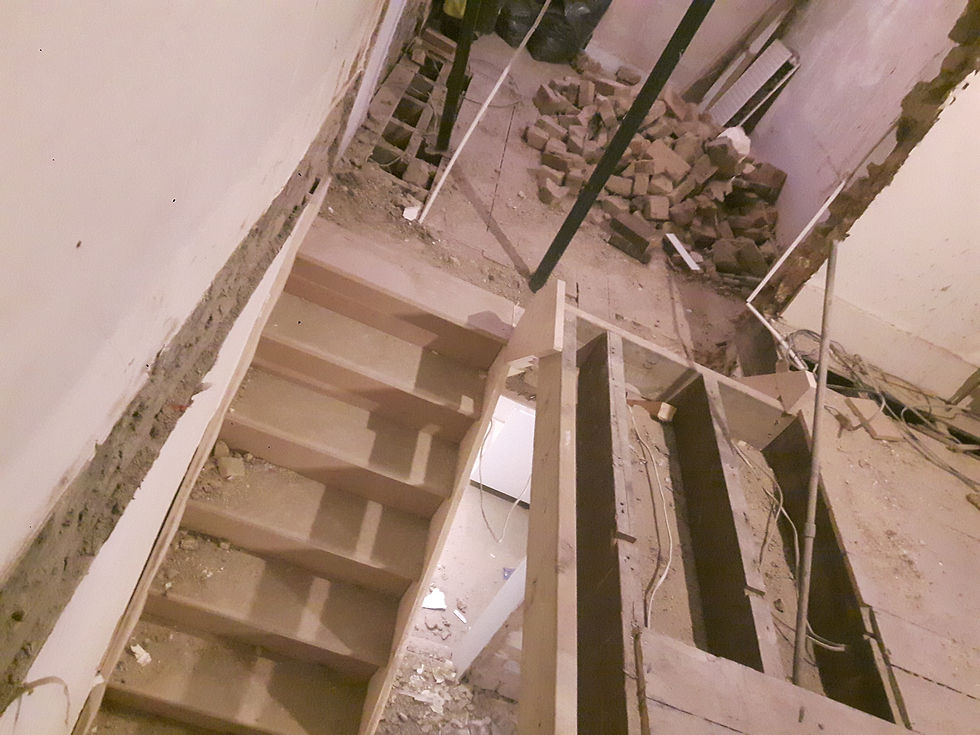Do I Need a Party Wall Agreement for My Extension or Loft Conversion?
- Tom Norris

- Sep 7, 2025
- 4 min read
Updated: Sep 8, 2025
Expert Advice for Homeowners in London & the Home Counties

Introduction
If you’re planning a kitchen extension in Surrey, a basement conversion in Chelsea, or a loft build in Streatham, you’ve probably heard about the Party Wall Act 1996. But what exactly is a Party Wall Agreement? Do you need one for your project? And what happens if your neighbour objects?
This guide will break it all down in plain English so you can start your home improvement plans confidently, avoid disputes, and keep your project moving smoothly.
What Is a Party Wall Agreement?
A Party Wall Agreement is a legally binding document (technically called a Party Wall Award) prepared by surveyors when your building work may affect a shared wall or a boundary. It sets out:
What work is being done.
How it will be carried out safely.
Protective measures for your neighbour’s property.
Access rights for contractors if needed.
How disputes or damage claims will be handled.
It protects both you and your neighbours, ensuring everyone’s rights are respected.
Does Every Project Need a Party Wall Agreement?
Not every project needs a Party Wall Agreement, but many common home improvements do. Here’s when the Act applies:
✅ Loft Conversions
Cutting into a shared wall to add steel beams (RSJs).
Raising a party wall to create extra headroom.
Removing a shared chimney breast.
✅ Extensions
Building a wall on or near the boundary line.
Excavating for new foundations within 3 metres of a neighbour’s property.
Constructing side or rear extensions that share or affect a wall.
✅ Basement Excavations
Digging within 3 metres of a neighbouring property with deeper foundations.
Excavating within 6 metres if using piles.
✅ Internal Structural Changes
Removing load-bearing walls or chimney stacks connected to a shared wall.
Converting houses into flats with structural changes to floors/ceilings.
In short: If your work is on or near a shared structure, you probably need a Party Wall Agreement.
Party Wall Agreement vs. Consent
You don’t always need a full Party Wall Award. If your neighbours:
Consent in writing within 14 days of your Party Wall Notice,…you can often proceed without a formal Award.
However, many homeowners still choose an Award for protection because it:
Documents the condition of both properties before work begins.
Prevents disputes if cracks or damage are alleged later.
How the Process Works
Step | What Happens | Timeline |
1. Serve a Party Wall Notice | Sent to all adjoining owners at least 2 months before work (or 1 month for excavations). | Start early |
2. Neighbour Response | They can consent, dissent, or ignore (silence = dissent). | 14 days |
3. Appoint Surveyor(s) | One Agreed Surveyor (faster, cheaper) or two separate surveyors. | Immediate |
4. Schedule of Condition | Surveyors inspect & record the neighbour’s property condition. | 1–2 weeks |
5. Party Wall Award Issued | Legal document sets out your rights, responsibilities, and protections. | 2–6 weeks |
Why Loft Conversions & Extensions Commonly Trigger the Act
London and the Home Counties are full of Victorian terraces, Edwardian semis, and period flats—homes built close together with shared walls. Even simple projects can impact neighbours:
Loft beams need support from shared walls.
Side extensions often sit directly on the boundary line.
Excavations can undermine neighbouring foundations.
Without a Party Wall Agreement, neighbours can seek an injunction to stop your work or claim compensation for damage.
Common Myths About Party Wall Agreements
Myth | Truth |
“I only need it if I share a wall.” | The Act also applies to excavations near your neighbour’s property—even for detached homes. |
“It’s just red tape; I can skip it.” | Skipping notices risks legal action, work stoppages, and higher costs. |
“It’s my house, so I don’t need permission.” | The Act gives neighbours legal rights, even if the wall is on your property. |
Real-Life Examples
Southfields Loft Conversion: We served notices to three neighbours for a loft build. Two consented, and one dissented. A Party Wall Award reassured the dissenting neighbour, and work began within six weeks.
Surrey Rear Extension: Foundations were dug within 3 metres of a neighbour’s home. A Party Wall Award with vibration monitoring avoided conflict and damage claims.
Kensington Basement: Complex excavation under a Grade II-listed townhouse required multiple notices and Awards. With expert surveyors, work went ahead smoothly.
Costs of a Party Wall Agreement
Notices: Free if you serve them yourself, or around £100–£200 if drafted professionally.
Surveyor Fees: Typically £700–£1,500 per surveyor for straightforward projects.
Party Wall Award: Usually £1,000–£1,500 all-in, depending on complexity.
Tip: Appointing a single Agreed Surveyor is cheaper and faster than using two surveyors.
FAQs
Q: Can I start work without an Agreement if my neighbours consent? Yes, but we recommend a Schedule of Condition for protection.
Q: What if my neighbour ignores the notice? Silence after 14 days counts as dissent. Surveyors will be appointed, and an Award prepared.
Q: Can a Party Wall Award stop my project? No. It doesn’t stop your work; it simply sets conditions for safety and protection.
Why Choose MET Surveyors
Decades of Experience: Thousands of lofts, basements, and extensions surveyed.
Local Knowledge: From Kensington townhouses to Surrey semis, we know the rules.
Fixed Fees: No surprises; clear pricing upfront.
Neighbour-Friendly: Our impartial approach keeps projects on good terms.
Full Coverage: Serving every London borough and Home Counties.
Start Your Project With Confidence
Planning a home improvement? Whether it’s a loft in Streatham, extension in Surrey, or basement in Chelsea, we’ll make Party Wall compliance simple.
Book a Callback: Speak directly to a Party Wall expert today.







Comments